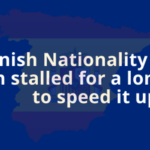The Law of Democratic Memory: A Commitment to Justice, Truth, and Reparations
On October 19, 2022, Spain reached a milestone in its recent history with the enactment of Law 20/2022 on Democratic Memory. This law strengthens and expands upon the principles set out in the 2007 Historical Memory Law, placing the victims of Francoism at its core and addressing long-overlooked historical demands. Beyond being a legislative act, this law represents a firm commitment to justice, truth, and reparations.
What is the Law of Democratic Memory?
The primary goal of the Law of Democratic Memory is to honor the memory of victims of the Spanish Civil War and the Franco dictatorship while reinforcing democratic values and human rights as the foundation of peaceful coexistence in Spain. The law aligns with international principles of truth, justice, reparation, and guarantees of non-repetition.
Among its most notable measures are:
- Recognition of victims and nullification of Francoist trials: The law declares Francoist tribunals illegal and annuls their sentences and sanctions, recognizing the suffering and injustice endured by the victims.
- Right to truth: It promotes the investigation and dissemination of events that occurred during the military coup, Civil War, and dictatorship. This includes the establishment of a Democratic Memory Center and the development of educational and outreach programs.
- Obligation of public institutions to preserve memory: Public institutions are required to maintain and share historical memory through initiatives such as:
- Including democratic memory in educational curricula.
- Reinterpreting significant sites, such as the Valley of Cuelgamuros (formerly the Valley of the Fallen).
- Removing symbols and honors that glorify Francoism.
- Victim registry and official memorial days: A Victim Registry is created to centralize scattered information and give visibility to their legacy. Additionally, official memorial days are established, such as October 31 (Day of Remembrance for Victims of the Military Coup and Dictatorship) and May 8 (Day of Remembrance for Exile Victims).
Spanish Nationality and the Law of Democratic Memory
One of the law’s most significant measures, particularly for those living outside Spain, is the opportunity to apply for Spanish nationality. This provision seeks to repair the harm suffered by those who were forced to leave the country due to political, ideological, or religious persecution, or as a direct result of the dictatorship.
The law outlines specific cases in which individuals may apply for Spanish nationality:
- Descendants of exiles: Children and grandchildren of individuals who were forced to leave Spain for political, ideological, religious reasons, or due to sexual orientation during the Civil War and dictatorship may apply for nationality.
- Restoration for Spanish women: Descendants of Spanish women who lost their nationality by marrying foreign citizens before 1978 are eligible to apply for Spanish nationality.
- Volunteers of the International Brigades: Descendants of those who served in the International Brigades during the Civil War are granted the right to Spanish nationality.
Procedures and Requirements
To prove that someone was exiled during the Franco regime, various documents may be used as evidence. Common examples include passports stamped with entries into host countries during that period, certificates issued by Spanish consulates in the host country, or documents from the International Refugee Office or local authorities confirming refugee status.
Other forms of evidence include immigration records from the country of settlement or documentation related to pensions provided by the Spanish government to exiles. Certificates issued by political parties or unions persecuted during the dictatorship may also serve as proof, provided these organizations can verify the individual’s membership or active participation.
Applying for nationality under the Law of Democratic Memory requires submitting specific documentation that establishes familial ties to victims or exiles. Frequently required documents include:
- Birth certificates proving family relationships.
- Certificates of exile issued by official organizations.
- Additional documentation supporting the applicant’s status as a victim or descendant.
Obtaining professional legal assistance is essential to ensure that all requirements are met and that the process is handled smoothly and effectively.
Why Was This Law Necessary?
The Law of Democratic Memory addresses the shortcomings of the 2007 Historical Memory Law. Over time, legal gaps and new demands from memorialist groups and international human rights organizations became apparent. Reports by the United Nations, such as the 2014 report by Special Rapporteur Pablo de Greiff, highlighted the need to strengthen mechanisms for justice and reparations.
This law also responds to a historical debt owed to thousands of victims and their families, aiming to build a collective memory that fosters democratic coexistence and ensures that past horrors are never repeated.
Why Choose Us?
At Galilea Abogados, we specialize in immigration and nationality law. We are here to help you understand how the Law of Democratic Memory can benefit you and your family.
If you are a descendant of exiles, a member of the International Brigades, or believe you meet the requirements to apply for Spanish nationality, don’t hesitate to contact us. Our team will guide you through the process, ensuring that every step is handled efficiently and with the utmost attention to detail.
Turn your rights into reality with the support of Galilea Abogados. We are committed to helping you transform the past into a gateway to a future of justice and dignity.
- Spanish Citizenship by Residence 2025 🇪🇸
- Modification of Residence and Work Permit from Employment to Self-Employment
- Visa-Exempt Countries for Spain✈️
- The new travel authorization for Spain: ETIAS🔔
- Everything about the Invitation Letter: Requirements, Documentation, and Costs🚀
- Expulsion order in Spain: What it means and how we can help you🚀
- Complete Guide: Return Authorization in Spain✈️
- Updates to the New Immigration Regulation: Key Changes for the Migrant Community
- Arraigo Application denied in Spain: What should I do?
- How to obtain Spanish nationality through the Law of Democratic Memory? We explain it to you!







